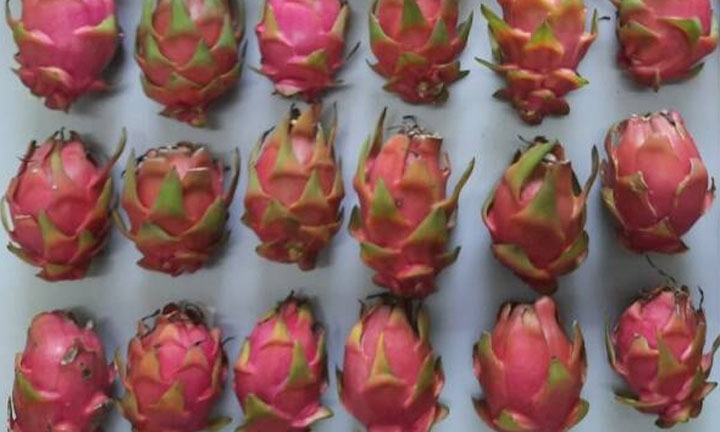by Divya Goyal, Indian Express
In a major push to crop diversification, the Punjab Agricultural University (PAU) has approved and recommended two varieties of dragon fruit suitable for cultivation in state, after more than five years of evaluation and research.
The state varietal approval committee has given a go ahead to the varieties — Red Dragon 1 and White Dragon 1— and have now been recommended for commercial cultivation after their average yield after fourth year of planting was found to be 8.35 kg/pillar and 8.75 kg/pillar, respectively.
Speaking to The Indian Express, Dr Harminder Singh, principal fruit scientist, PAU, said that both varieties have been tested and evaluated by PAU in Punjab conditions after the varsity had procured germplasm from ICAR recognized institutes in Maharashtra and Andaman and Nicobar Islands. He said that since some years, a handful of farmers are already practising dragon fruit farming in state and earning profits but with PAU officially recommending these two varieties now, more farmers will hopefully adopt it as a crop which fetches good prices in the open market.
“The Department of Fruit Science, PAU, had initiated evaluation of dragon fruit with the introduction of 100 cuttings from National Institute of Abiotic Stress Management (NIASM), ICAR Malegaon, Pune, Maharashtra in the month of February 2017. Again in 2019, three more varieties of dragon fruit were brought from ICAR-Central Island Agricultural Research Institute (CIARI), Port Blair, Andaman and Nicobar Islands, for evaluation under Punjab conditions. Though we had tested three types in PAU campus — white-fleshed dragon fruit (Hylocereus undatus), red-fleshed dragon fruit (Hylocereus polyrhizus) and yellow-fleshed dragon fruit (Hylocereus megalanthus), we have recommended white and red ones for farmers as they gave better results,” said Dr Singh.
Dr Singh added that dragon fruit, which is also known as pitaya (Hylocereus sp.) belongs to family Cactaceae. It is a fast growing perennial vine cactus and originated in Mexico and Central and South America. This fruit is widely grown in Vietnam, Thailand, Taiwan, Indonesia, Malaysia, Israel, Nicaragua, Australia, US, Mexico etc. In India, dragon fruit is being cultivated in Kerala, Karnataka, Tamil Nadu, Andhra Pradesh, Maharashtra, Gujarat and some other states. Dragon fruit is a very good source of antioxidants as it is rich with beta carotene, lycopene, vitamin E, vitamin C along with high content of phosphorus and calcium. It also contains fatty acids, i.e., 48 per cent linoleic acid and 1.5 per cent linolenic acid in its black seeds.’
He added that for farmers of Punjab, who are currently entangled in wheat-paddy cycle and facing issues such as depleting water table and deteriorating soil health, dragon fruit cultivation can bring many advantages. “The main advantage of this fruit is that, once planted it may give fruits upto 20 years. It is very easy to propagate. Market demand is quite high and farmers can fetch good returns,” he said.
However, initially, farmers might also have to face some issues such as high investment to establish a training system for climbing cactus vines, problem of Erwinia and other bacterial rots, wilting of succulent vines during summer months and the flowering period coincide with rainy season resulting loss of flowers and fruits.
PAU is now all set to provide dragon fruit seeds of recommended varieties from July onwards. “The plant yields fruit from July to November. Farmers can buy seeds from PAU July onwards,” said Dr Singh.
He added that the quality of fruits produced in PAU campus was outstanding with 200-250 g fruit size.
PAU releases schedule of Kisan Melas
The Punjab Agricultural University has released the itinerary for the series of seven Kisan Melas to be held in March. The series will kick start with the first Kisan Mela at Nag Kalan Jahangir, Amritsar on March 2 followed by Ballowal Saunkhri, Gurdaspur and Faridkot on March 7, 10 and 14, respectively.
Kisan Melas at Rauni in Patiala and Bathinda will be organised on March 16 and 21, respectively. The concluding two-day Kisan Mela at PAU campus, Ludhiana is slated for March 24 and 25.
Dr Satbir Singh Gosal, Vice-Chancellor, PAU, observed that agricultural expansion with thrust on economic growth by addressing the challenges of natural resource depletion and climate crisis is a research-priority of PAU.

